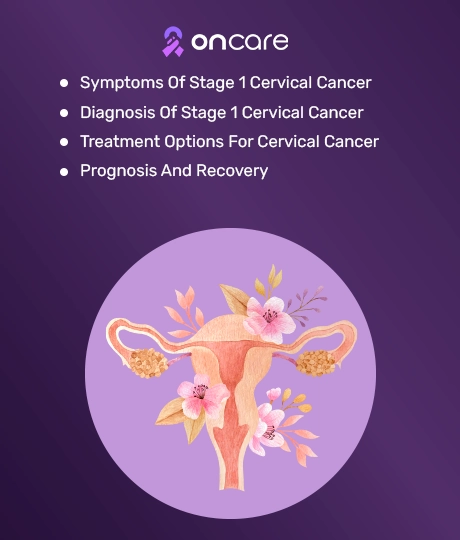Stage 1 Cervical Cancer Symptoms & Treatment Options

Cervical cancer is a disease concerned with the cells within the cervix. During the first stage, the cancer is only confined to the cervix and has not spread to other tissues. Early detection is the best thing in the face of effective treatment and better outcomes. Women who are aware of the symptoms and treatment options of this type of cancer are able to handle this situation better. They are also able to make educated decisions regarding later care. For those looking for expert guidance and compassionate care in their cervical cancer-battling journey, Oncare offers a range of well-meaning services. We ensure you get personalized treatment for stage 1 cervical cancer. Our use of cutting-edge technology means better treatment outcomes for you without further complications. Oncare forever stands as a trusted partner in your fight against cervical cancer.
So, today, in this article, we'll make you familiar with stage 1 cervical cancer symptoms and treatment options.
Symptoms Of Stage 1 Cervical Cancer
Here are the symptoms of stage 1 cervical cancer you should know about:
Abnormal Vaginal Bleeding
A common symptom of stage 1 cervical cancer is abnormal vaginal bleeding. This bleeding usually occurs between the menstrual cycle, after sexual intercourse, or after menopause. While abnormal bleeding can have various other causes, it is important to get it checked on time.
Unusual Vaginal Discharge
Women also see a change in the nature or amount of their vaginal discharge. This can be a watery, bloody, or foul-smelling discharge. These may usually be signs of other infections or benign conditions but persistently unusual discharge should not be ignored.
Pelvic Pain Or Discomfort During Intercourse
Some women report pelvic pain or discomfort during sexual intercourse as well. This pain can have a direct relation to the developing lesion in the cervix. It is important for you to seek medical advice if pelvic discomfort persists over time. Early diagnosis of cervical changes leads to better management of the condition over time.
At this point in the journey, our oncologists take special care to put you through thorough evaluation and guidance. These symptoms can be managed properly when you trust our comprehensive care regime that ensures your assessments are accurate and timely.

Diagnosis Of Stage 1 Cervical Cancer
Here is how you can go about the diagnosis of stage 1 cervical cancer:
Pap Smears And HPV Testing
A pap smear is a routine screening tool. It collects cells from the cervix to find any signs of abnormalities. This test is very important, especially when it comes to detection of cervical cancer. Additionally, Human Papillomavirus (HPV) testing is performed along with Pap smear because cervical cancers are caused by high-risk strains of HPV. Regular check-ups with pap smears and HPV tests ensure timely detection of precancerous changes that can become serious conditions.
Colposcopy
If abnormal cells are found in a pap smear, a colposcopy is performed. This procedure includes the use of specialized microscopes to closely look into the cervix. The colposcope brings a magnified view to the physician so they can find areas of abnormal tissue that need further testing.
Biopsy
If even a colposcopy points to areas of concern, a biopsy is performed. Here, a small sample of the tissue from the cervix will be examined. The sample’s analysis can determine if there are any cancerous or precancerous cells present. Biopsy results are important to confirm a diagnosis and find out the best course of treatment.
Imaging Tests
While stage 1 cervical cancer is within the cervix, imaging tests like MRI or CT are also done to ensure the disease is not spreading. This helps plan proper treatment. These tests give detailed images of the pelvic region to ensure that the extent of the disease is properly understood.
Oncare puts together these diagnostic techniques with a patient-centric approach. Our advanced imaging and laboratory services ensure our cancer specialists can provide you with a precise diagnosis. From there, we formulate the most effective treatment plan for your stage 1 cervical cancer as well.
Treatment Options For Cervical Cancer
We at Oncare use the latest technology to offer a wide range of treatment options with utmost precision and care. Our team of oncologists works closely with each patient to tailor their treatment plan that maximizes effectiveness while minimizing side effects. Here are the most effective treatment options for stage 1 cervical cancer:
Surgical Treatments
Surgical treatment is the first-hand treatment option for stage 1 cervical cancer. Its goal is to remove the cancerous tissue without interfering with the patient’s reproductive health.
Conization
Conization is also called cone biopsy. It involves the removal of a cone-shaped piece of tissue from the cervix that contains cancerous cells. This process removes abnormal tissues while also providing a sample for further pathological examination.
Hysterectomy
If the stage 1 cervical cancer is extensive, a hysterectomy is performed. This surgical method is where the uterus and cervix are removed altogether. Even the surrounding tissues are removed sometimes. A hysterectomy is a radical option but it does ensure that each and every cancerous cell is removed. Hysterectomies are performed only after thorough consultation and consent of the individual, especially if they do not have any future reproductive plans.
Radical Trachelectomy
For women who wish to preserve their fertility, a radical trachelectomy is recommended. This is when the surgery removes the cervix and its surrounding tissues without interfering with the uterus. This is a more complex procedure but better for women who wish to maintain their reproductive potential. This approach is also done on the basis of the tumor’s size and location.
Radiation Therapy
Radiation therapy is another important treatment option for stage 1 cervical cancer. It can either be a primary treatment or be combined with surgery. Radiation’s purpose is to destroy cancerous cells using high-energy rays.
External Beam Radiation
External beam radiation therapy (EBRT) includes the use of radiation on the pelvic region from outside the body. This method targets the tumor or any other microscopic diseases that are present in the surrounding tissues. EBRT is done over the course of many weeks so that healthy tissue recovers between sessions.
Brachytherapy
Brachytherapy is a special radiation therapy form where radioactive material is put directly inside or near the tumor. This method gives a high dose of radiation to the cancerous areas while putting lesser exposure on the healthy tissues. This is usually done with EBRT to enhance the overall effectiveness of the treatment.
Chemotherapy
Chemotherapy can be used along with radiation therapy to treat stage 1 cervical cancer. This is done particularly when there is a risk of microscopic disease beyond the cervix. Chemotherapeutic drugs work by targeting cells that are constantly dividing, including cancer cells. When used with radiation, chemotherapy increases the sensitivity of the cancer cells to treatment. This helps with overall effectiveness.
Prognosis And Recovery
The prognosis for stage 1 cervical cancer is usually favorable. This is true, especially when the disease is caught earlier and managed with good treatment. Modern surgical techniques and radiation therapy help patients experience a higher rate of successful outcomes. Recovery times vary based on the chosen treatment and the person’s overall health.
Recovery is not just about physical healing. It also included the emotional and psychological well-being of the person. Patients are usually advised to be part of support groups and counseling sessions where they can navigate the challenges of treatment together. Continuous follow-up care is important so any sign of recurrence can be curbed and the patient can maintain optimal health.
Conclusion
Understanding stage 1 cervical cancer is important for timely care. The treatment options are made to effectively curb the problem without affecting your quality of life. Patients who take their healthcare seriously with timely screening and get an HPV vaccine are more likely to avoid this cancer altogether. However, in case one does get it, successful treatment is guaranteed with attention to your health and timely medical attention. With Oncare’s commitment to advanced diagnostics and world-class facilities, every person who wants compassionate cancer care shall be looked after.